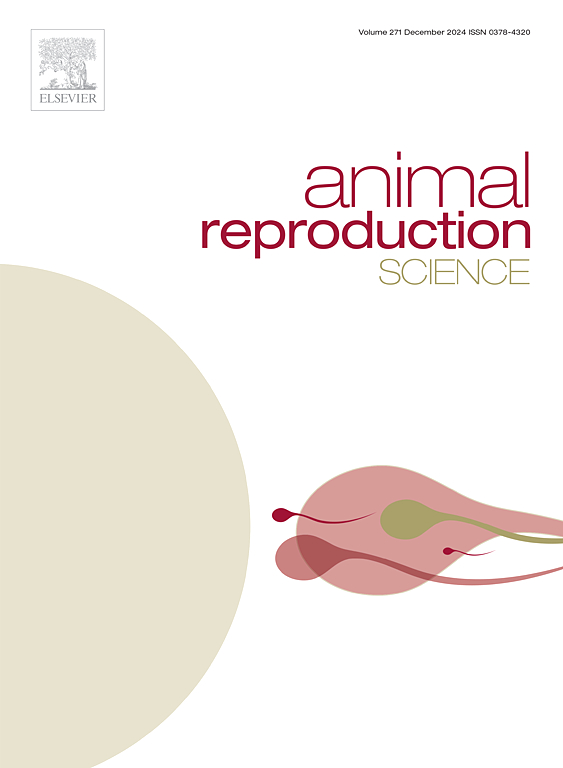The cryoprotective effect of virgin coconut oil on boar sperm: Enhancing sperm quality and reproductive performance
IF 3.3
2区 农林科学
Q1 AGRICULTURE, DAIRY & ANIMAL SCIENCE
引用次数: 0
Abstract
This study evaluated virgin coconut oil (VCO) as a natural cryoprotectant for boar sperm preservation. Duroc boar semen was cryopreserved with varying VCO concentrations (0.00 %, 0.01 %, 0.05 %, 0.10 %, 0.50 %, and 1.00 %). Comprehensive analysis revealed 0.1 % VCO optimally maintained post-thaw sperm quality, significantly improving motility, membrane integrity, acrosome integrity, and mitochondrial potential compared to controls. It also enhanced the activity of antioxidant enzymes, glutathione peroxidase (GSH-Px) and superoxide dismutase (SOD). The optimal concentration was then used in artificial insemination (AI) trials to assess in vivo fertility. Metabolomic analysis identified significant alterations in lipid and energy metabolism pathways, with particular changes in N-acetylneuraminic acid and lysophosphatidylcholines that correlated with sperm quality improvements. These findings demonstrate VCO's effectiveness in protecting boar sperm during cryopreservation through multiple mechanisms including membrane stabilization, oxidative protection, and metabolic regulation. The 0.1 % VCO supplementation presents a practical solution for swine artificial insemination programs, offering both cryoprotective benefits and potential cost advantages over conventional additives.
初椰油对猪精子的冷冻保护作用:提高精子质量和生殖性能
本研究评价了初椰油(VCO)作为天然冷冻保护剂保存野猪精子的效果。杜洛克猪精液以不同的VCO浓度(0.00 %、0.01 %、0.05 %、0.10 %、0.50 %和1.00 %)冷冻保存。综合分析显示,与对照组相比,0.1% % VCO可最佳地维持解冻后精子质量,显著提高精子活力、膜完整性、顶体完整性和线粒体潜能。提高了抗氧化酶、谷胱甘肽过氧化物酶(GSH-Px)和超氧化物歧化酶(SOD)的活性。然后将最佳浓度用于人工授精(AI)试验,以评估体内生育能力。代谢组学分析发现了脂质和能量代谢途径的显著改变,特别是与精子质量改善相关的n -乙酰神经氨酸和溶血磷脂酰胆碱的变化。这些研究结果表明,VCO通过多种机制,包括膜稳定、氧化保护和代谢调节,在低温保存过程中保护猪精子的有效性。添加0.1% % VCO为猪人工授精计划提供了一个实用的解决方案,与传统添加剂相比,它既具有冷冻保护效果,又具有潜在的成本优势。
本文章由计算机程序翻译,如有差异,请以英文原文为准。
求助全文
约1分钟内获得全文
求助全文
来源期刊

Animal Reproduction Science
农林科学-奶制品与动物科学
CiteScore
4.50
自引率
9.10%
发文量
136
审稿时长
54 days
期刊介绍:
Animal Reproduction Science publishes results from studies relating to reproduction and fertility in animals. This includes both fundamental research and applied studies, including management practices that increase our understanding of the biology and manipulation of reproduction. Manuscripts should go into depth in the mechanisms involved in the research reported, rather than a give a mere description of findings. The focus is on animals that are useful to humans including food- and fibre-producing; companion/recreational; captive; and endangered species including zoo animals, but excluding laboratory animals unless the results of the study provide new information that impacts the basic understanding of the biology or manipulation of reproduction.
The journal''s scope includes the study of reproductive physiology and endocrinology, reproductive cycles, natural and artificial control of reproduction, preservation and use of gametes and embryos, pregnancy and parturition, infertility and sterility, diagnostic and therapeutic techniques.
The Editorial Board of Animal Reproduction Science has decided not to publish papers in which there is an exclusive examination of the in vitro development of oocytes and embryos; however, there will be consideration of papers that include in vitro studies where the source of the oocytes and/or development of the embryos beyond the blastocyst stage is part of the experimental design.
 求助内容:
求助内容: 应助结果提醒方式:
应助结果提醒方式:


